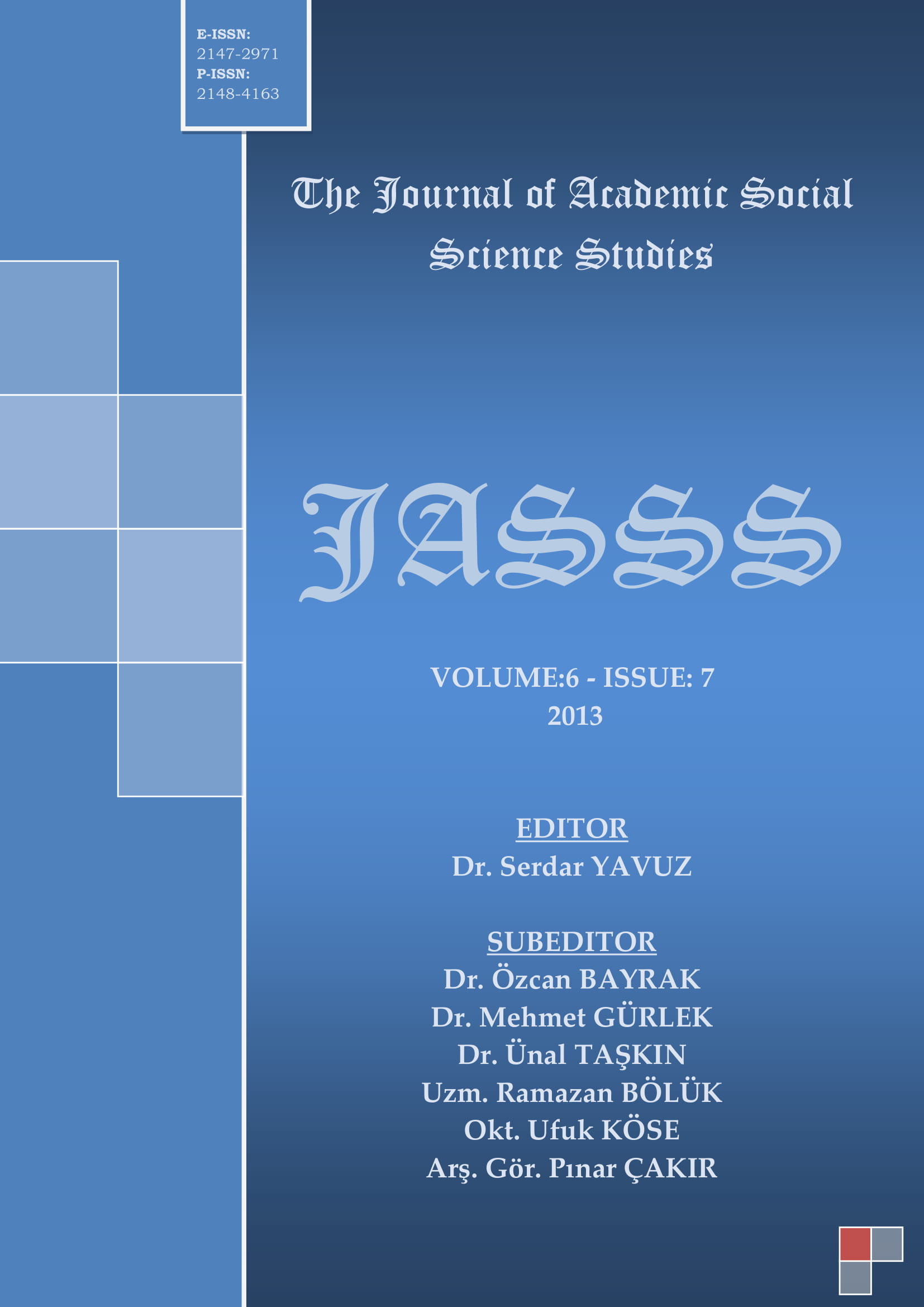Author :
Abstract
Özellikle sanayi devrimi sonrasında ülkelerin büyüme sürecinde kat ettikleri yolları sadece fiziki ve beşeri sermaye birikimi ile açıklamak mümkün değildir. Bu yeni evrede bilgi toplumuna dönüşümle birlikte beşeri sermayenin yanı sıra sosyal sermayenin de yapılan ekonomik analizlere dahil edilmesi gerekmektedir. Bu düşünceden hareketle çalışmanın hedefi, sosyal sermaye ile ekonomik büyüme arasındaki ilişkinin araştırılması olarak belirlenmiştir. Çalışma kapsamında 1995 ile 2008 yılları arasında verilerine ulaşılabilen 69 ülke, ülkeler arası yatay kesit analizi (Cross Sectional Analysis) yöntemiyle analiz edilmiştir. Bu çalışma ile hedeflenen bir diğer amaç ise sosyal sermayenin, farklı gelir gruplarına dahil ülkelerin ekonomik büyümeleri üzerine olan etkilerinin sorgulanmasıdır. Bu amaç doğrultusunda 69 ülke Dünya Bankası sınıflama kriterlerine göre üst, orta, alt orta ve üst orta olmak üzere dört ayrı gelir gurubuna ayrılmış ve analizler her grup için ayrı ayrı geçekleştirilmiştir. Üst gelir grubuna dahil olan ülkelerin sosyal sermaye düzeyi ile ekonomik büyümeleri arasında istatiksel olarak anlamlı bir ilişki bulunamaz iken, orta düzey gelir grubuna dahil olan ülkeler için gerçekleştirilen analizde ülkelerin sosyal sermayesi ile ekonomik büyüme arasında istatiksel olarak anlamlı pozitif yönlü bir ilişki bulunmuştur. Alt gelir grubuna dahil ülkelerin analizi, yeterli veri olmaması nedeniyle yapılamamıştır. Bu sebeple orta gelir düzeyine sahip ülkeler dünya bankası vasıtasıyla üst-orta ve alt-orta gelir grubuna dahil ülkeler olarak ikiye ayrılmış, analiz her iki grup için ayrı ayrı gerçekleştirilmiştir. Gerçekleştirilen analizler sonucunda üst-orta gelir gurubuna dahil olan ülkelerde sosyal sermaye ile ekonomik büyüme orasında istatiksel olarak anlamlı bir ilişki bulunamaz iken alt-orta gelir grubuna dahil ülkeler için yapılan analizde, sosyal sermaye ile ekonomik büyüme arasında pozitif yönlü bir ilişki bulunmuştur. Söz konusu ilişki yapılan analizler içerisinde en yüksek katsayı ile temsil edilmektedir. Bu durumda, gelir seviyesinde meydana gelen azalma ile birlikte sosyal sermayenin ekonomik büyüme açısından öneminin arttığı söylenebilir. Ekonomik büyümenin belirleyicileri konusunda yapılan çalışmaların artması, açıklayıcı değişkenlerin sayısını artırırken kurulan modellerin ve kullanılan değişkenlerin güvenilirliğini azaltmıştır. Bu sebeple çalışma kapsamında, kullanılan model ve yöntemin sağlamlığını test etmek amacıyla; Güçlü işaret testi (S
Keywords
Abstract
Particularly after the period as the industrial revolution, it is not possible to explain the road hit by the countries only via the physical capital and social capital accumulation. In this new period, along with transformation towards being a new information society, together with the social capital, the social capital itself should be involved in the economic analysis. Hence, the aim of this study is composed as the relationship between the social capital and economic growth. In the scope of this study, these 69 countries of which data is accessible for the years between 1995 and 2008 are analyzed with the Cross Sectional Analysis. Another aim which was determined via this study is questioning the effects of social capital upon the countries which are among the different income groups. For this purpose, 69 countries were categorized into four income groups according to the World Bank categorization criteria as upper, middle, middle-lower and lower classes, and also the analysis for each group was carried out respectively for each group. For the countries which belong to the upper class, there could not found any meaningful relation between their social capital and economic growth, yet in the analysis for the countries which belong to the middle class, there is a found a statistically meaningful positive relation. The analysis for the countries which belong to the lower income group could not be carried out because of the insufficient data. Because of this reason, by means of World Bank the countries which have middle level income was categorized into two categories as upper middle and lower middle classes, and the analysis for each group was done respectively. As a result of the analysis was carried out, in the countries which belong to the upper middle income level, there could not be found any statistically meaningful relationship between the social capital and economic growth, yet for the countries which belong the lower middle category in the analysis a positive relation was caught between the social capital and economic growth. The discussed relationship in the analysis was represented with the highest coefficient. In this case, it can be argued that owing to the decrease in income level the importance of social capital for economic growth can increase. The increase of the studies upon the determiners of economic growth increased the number of the explanatory variables, on the other hand decreased the trustworthiness of the models and used vari
